
Hair Basics
Hair is primarily made up of a sulfur rich protein called Keratin. Keratin is made from a combination of amino acids and micronutrient cofactors. Important nutrients for healthy hair formation include :Sulphur, Biotin, Iron, Copper, Lysine, Zinc, Manganese, Proline, Vitamin D, and B vitamins.
How Does Hair Grow?
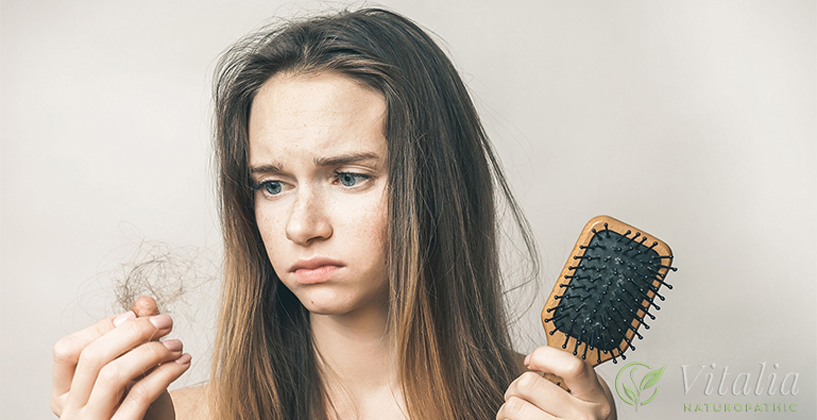
Hair grows from the base of the follicle, known as the bulb. The Bulb is supplied with nutrients from the body via tiny blood vessels. The cells of the bulb divide rapidly which results in 0.3 mm to 0.4mm of hair growth above the scalp, per day. The bulb and hair follicle are susceptible to subtle changes in their environment. Hormonal changes, chemicals, stress, and poor nutrition will significantly impact the rate of division and quality of cells being produced.
Hair growth follows three stages: anagen, catagen, and telogen. At any given time, a random number of hairs will be in one of three stages of growth and shedding.
Common Hair Loss Factors
Hair Loss and Iron Deficiency
Iron deficiency anemia can cause hair loss as a symptom. Iron is necessary for the production of hemoglobin, which is a protein in red blood cells that carries oxygen to the body's tissues. When there is not enough iron in the body, the hair follicles may not be getting enough oxygen, which can lead to hair loss. Low iron may also trigger telogen effluvium- a rapid shedding of the hair. Other symptoms such as fatigue, pale skin, shortness of breath, and headaches are more common in individuals with iron deficiency anemia. If you are experiencing hair loss and suspect that it may be related to iron deficiency anemia, it's best to test to see if your ferritin levels are optimal for hair growth.
Hair Loss and Stress
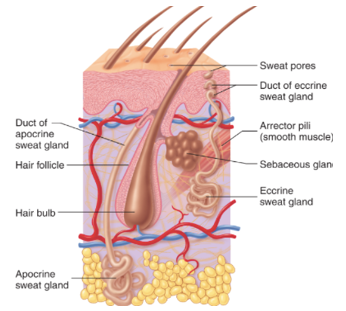
Stress can cause hair loss in several ways, one of which is known as telogen effluvium. When a person experiences a significant amount of stress, it can cause a disruption in the hair growth cycle. Normally, hair goes through a growth phase, a rest phase, and a shedding phase. During the shedding phase, hair falls out naturally. However, stress can cause more hair to enter the shedding phase and less to enter the growth phase, leading to hair loss.
Another way stress can cause hair loss is through the release of stress hormones, such as cortisol. These hormones can cause inflammation in the hair follicles, leading to hair loss. Additionally, stress can also cause changes in the immune system, which may lead to hair loss.
It is important to note that hair loss caused by stress is usually temporary and hair growth will usually return to normal once the stress has been managed. Adrenal health can be assessed through saliva, or urine testing of key adrenal hormones such as DHEAS and cortisol.
Hair Loss and Hypothyroid
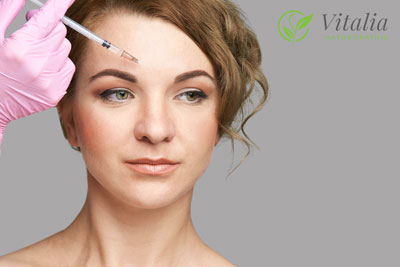
Hypothyroidism, or an underactive thyroid, can cause hair loss, typically seen as diffuse thinning. The thyroid gland plays a key role in regulating the body's metabolism, which includes the growth and development of hair. When the thyroid gland is not producing enough hormones, it can lead to a slowing down of the hair growth cycle. If your hair is starting to decrease lustre, or tangle easier, this can be a sign of low thyroid hormone.
Hair loss that is caused by hypothyroidism is usually reversible with prompt and proper treatment. This may include thyroid hormone replacement therapy, which can help optimize the levels of thyroid hormones in the body, and thus help to stop or slow down the hair loss. For more information on thyroid testing and treatments click HERE
Hair Loss and PCOS
Polycystic ovary syndrome (PCOS) is a condition in which the ovaries produce an excessive amount of androgens, which can lead to hair loss. The hair loss pattern for PCOS is called androgenic alopecia, known as female pattern hair loss. . This type of hair loss is caused by a sensitivity of the hair follicles to the androgen, which can cause the hair to become thinner, fall out, or stop growing.
PCOS can also cause an imbalance in the levels of estrogen and progesterone, which can affect the hair growth cycle. This can also cause hair to become thin and brittle.
Additionally, PCOS can lead to a condition called insulin resistance, which can cause an increase in the levels of insulin in the body. High levels of insulin can also contribute to hair loss.
Hair Loss and Nutrient Deficiencies
Nutrient deficiencies can cause hair loss because the hair follicles require a variety of nutrients to grow and stay healthy. Deficiencies in key nutrients such as iron, vitamin D, B Vitamins, lysine, magnesium, and zinc, for example, can lead to hair loss. Individual nutrients may be tested through life labs such as iron, RBC magnesium, and B12 levels, or a comprehensive micronutrient panel may be recommended. A lack of protein in the diet can also contribute to hair loss, as the hair strand itself is made up of a protein called keratin, and protein supports our bodies’ metabolism. Without adequate nutrition, the hair follicles may become weak and shrink, leading to hair loss.
Hair Loss and Menopause
As we age, our hair naturally becomes thinner. As we reach menopause, circulating levels of estrogen and progesterone decrease- two hormones that hair love! Androgenic alopecia may also begin in woman around peri-menopause and menopause when female hormones begin to decline along with sex hormone binding globulin (SHBG). As the name implies, SHBG binds hormones, such as testosterone, making them less bioavailable. So while total testosterone may not be increasing during menopause, the amount available to reach target cells does increase, thus allowing DHT to rise and hair to thin. For more information on menopause click HERE.
Forms of Hair Loss
Telogen Effluvium
Telogen effluvium is an increase in hair loss above the norm, which is typically below 100 hairs/ day. Telogen Effluvium is very common, especially in women, and is typically temporary. Clients may notice hair coming out in clumps in the shower, or waking with more hairs on the pillow. Stressful events on the body can trigger Telogen Effluvium such as labor, surgery, mental stress and fever/illness, hormonal changes (such a peri-menopause, thyroid disorder, changes to birth control, birth), changes to nutrition levels, hair dye, medications, weight loss. Hair loss typically starts 3-4 months after the stressor, and will last for 3-6 months. There can be many causes for ongoing, or chronic hair shedding including: nutritional status, iron deficiency, continued stress, medications, poor gut health, hormone imbalance and weight loss. Once the aggravating factor is identified and resolved, typically we see slowing of shedding and regrowth.
Androgenic Hair Loss
The most common form of hair loss we see at Vitalia in both men and women is androgenic alopecia. This condition is inherited from your mom or dad’s sides of the family. Hair loss can be dependent on numerous factors, but leading factors are genetics (which increases your hair follicle sensitivity to androgens) and androgen levels in the body.
Male Pattern Hair Loss
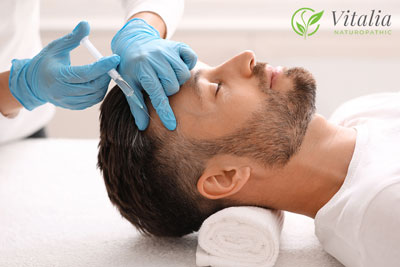
Male Pattern Hair Loss or androgenic alopecia, typically presents as hair loss at temples, front hairline and or crown. This can progress to balded areas along the top half of scalp. The main hormone responsible for this loss is DHT, and there is often a genetic connection. Early intervention for hair preservation is key. Treatments at Vitalia may include, topical Minoxidil, Finasteride (oral or topical), natural hormone support(such as Saw Palmetto) , PRP injections, and neutraceutical supplementation.
Female Pattern Hair Loss
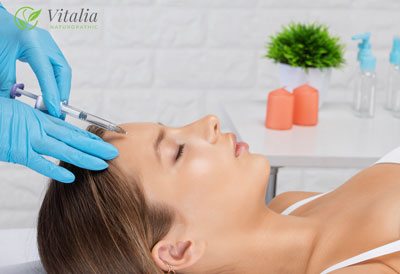
In women, androgenic alopecia, also known as Female Pattern Hair Loss, can present as widening of the part line, thinning of the ponytail diameter, and or more visible scalp. While hair can become quite thin, women rarely experience baldness like we can see in Male Pattern Hair Loss. Clients experiencing PCOS may experience this form of hair loss as PCOS presents with elevated androgens such as Testosterone and DHEAS. In addition to hair loss, clients with PCOS may experience cystic acne, hirsutism, weight gain, insulin resistance, mood changes and or irregular/ infrequent periods. Comprehensive hormonal testing is available at Vitalia, including DUTCH hormone testing, or laboratory blood markers. Treatments at Vitalia may include, diet and lifestyle recommendations, hormone balance, spironolactone, topical Minoxidal, PRP injections ( Platelet Rich Plasma using Health Canada Approved Puraplas system), and nutraceutical supplementation.
Alopecia Areata
Alopecia Areata is form of hair los less common and is an autoimmune cause of hair loss. It may present from patchy areas of hair loss that come and go, to complete loss of hair on the body. At Vitalia we are happy to work alongside your dermatologist when experiencing Alopecia Areata. We address general factors contributing to hair loss in addition to naturopathic approaches to autoimmune conditions such as stress management and gastrointestinal health.
Treatments for Hair Loss
Identifying the cause of hair loss is the first step in initiating successful treatment. Not all cases of hair loss may be treated the same.
For androgenic hair loss in men (male pattern hair loss), one common treatment option is an oral DHT blocker such as finasteride. To avoid systemic side effects of oral medication- topical finasteride and or minoxidil are also available options. PRP may be recommended.
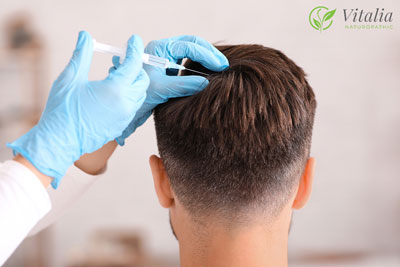
For androgenic hair loss in females (female pattern hair loss), oral spironolactone is commonly recommended. Topical spironolactone/ and or minoxidil combination are available to mitigate possible systemic side effects of oral medication. PRP may be recommended also in cases of female pattern hair loss. In cases of hair loss with PCOS, hormone regulation is the first step for hair treatment. This may involve treating insulin resistance, elevated testosterone and or DHEAS. Natural approaches may include dietary recommendations such has reduction of refined carbohydrates and meal timing. Common supplements used for PCOS are myo-inositol and or berberine. For more information on female hormone testing visit HERE .
Saw Palmetto can be used in both men and women to help block DHT and its effect on the hair follicle.
Optimization of key nutrients such as iron, zinc, B-Vitamins, Vitamin C, Vitamin E, lysine, Vitamin D and selenium through diet or supplementation may be recommended. We offer a serum micronutrient test panel for assessment of nutrient levels, which can be useful in all cases of hair loss.
When there is high or chronic stress, an adrenal evaluation might be recommended through saliva or urine testing. Balancing cortisol and DHEAS levels through lifestyle and adrenal supplementation is another approach to supporting hair growth. A common adrenal herb used for balancing cortisol and feelings of stress is Ashwagandha (use with caution with auto-immune conditions).
In cases of poor digestion, GI testing may be recommended such as screening for SIBO, candida, and microbiome imbalances. For more information on digestive health, click HERE.
This text is informative only and is not meant to treat or diagnose- please consult a physician for treatment options for you.
For more information on hair restoration treatment please call 604 566 9355. You can also visit our FAQ, for more information click HERE

Hair thinning is a very common condition seen in both men and women. There are many different causes of hair thinning or hair loss.
What are some of the causes of hair thinning or loss?
Nutritional deficiencies is a common cause of hair thinning, especially in women. Low iron is one of the most common deficiencies that leads to hair thinning.
Hormones is another reason why your hair may be thinning. Androgenic alopecia, also known as male pattern hair loss, is very common in men. It has to do with a hormone called DHT (dihydrotestosterone). DHT is converted from Testosterone via an enzyme 5-alpha reductase.

Androgenic alopecia may occur in woman due to ovarian cysts, the use of birth control pills, pregnancy, and menopause. It is common in conditions such as polycystic ovary syndrome (PCOS) where there is a reduction in progesterone and an increase in circulating androgens. It also begins in woman around perimenopause and menopause when female hormones begin to decline along with serum hormone binding globulin (SHBG). As the name implies, SHBG binds hormones, such as testosterone, making them less bioavailable. So while total testosterone may not be increasing during menopause, the amount available to reach target cells does increase, thus allowing DHT to rise and hair to thin.
Thyroid and stress hormones may also impact hair health. After a period of high stress, some people may start to notice increased hair shedding and a reduction in the growth of new hair. This condition called telogen effluvium, often begins 3-6 moths after a stressful event. Thankfully, this type of hair loss is reversible.
There are treatment options to help restore your hair health. The starting place is to determine the cause of hair loss and begin an appropriate treatment plan. Basic blood work that includes a CBC with differential, and iron panel or ferritin, thyroid tests, basic hormones including DHEA and inflammatory markers is a great starting place. Combine these tests with good history taking and the cause of hair loss may be determined. In some cases, your Naturopathic Doctor may recommend a Food allergy test , an adrenal panel or a complete hormone panel .
Once we have determined a cause, a treatment plan will be developed. This may involve balancing hormones, supplements to support hair growth, and managing stress.
Book a consultation today with one of our Naturopathic Doctors to learn more about our treatments for hair loss.
Q and A: All About Hair
What is hair made of?
Hair is primarily made up of a sulfur rich protein called Keratin. Keratin is made from a combination of amino acids and micronutrient cofactors. Important nutrients for healthy hair formation include :Sulphur, Biotin, Iron, Copper, Lysine, Zinc, Manganese, Lysine, Proline, Vitamin D, and B vitamins.

How Does Hair Grow?
Hair grows from the base of the follicle, known as the bulb. The Bulb is supplied with nutrients from the body via tiny blood vessels. The cells of the bulb divide rapidly which results in 0.3 mm to 0.4mm of hair growth above the scalp, per day. The bulb and hair follicle are susceptible to subtle changes in their environment. Hormonal changes, chemicals, stress, and poor nutrition will significantly impact the rate of division and quality of cells being produced.
Hair growth follows three stages: anagen, catagen, and telogen. At any given time, a random number of hairs will be in one of three stages of growth and shedding.
How do Hormones Affect Hair?
Estrogen: can stimulate new hair growth and extend the anagen phase. Hair thinning in women generally becomes noticeable around menopause and in conditions like PCOS where female hormones are lower and androgens elevated.
Progesterone: This hormone helps keep your hair thick and full by counteracting, or inhibiting, the effects of 5-alpha reductase, which converts testosterone to dihydrotestosterone (DHT). DHT is a strong testosterone and is responsible for hair miniaturiziation seen in androgenetic hair thinning.
Dihydrostetosterone (DHT): (DHT): This hormone is the main culprit of hair thinning and loss. Hair loss is an inevitable part of aging. Hormonal imbalances, certain health conditions, and some medications can also contribute to thinning hair.
What Causes Hair Loss in Men and Women?
While men are more likely to lose hair than women, many females also struggle with premature hair loss. Reasons can range from nutrient deficiencies to more serious underlying health conditions. Treatment primarily depends on the cause of the hair loss and its severity. Most of the time treating the underlying cause can curb hair loss. For example, physical stress in the form of surgery, trauma, or illness can cause temporary hair loss. Once the stress has ceased, the hair loss will typically come to a halt.
Hormonal problems, such as imbalances, are a fairly common cause of hair loss. In some cases such as pregnancy, the hair loss is temporary until the hormones level out following birth. In other causes, chronic hormone problems can cause continued hair loss. Elevated androgens, insulin issues, and fluctuating thyroid levels can also lead to hair loss. If you think that your hair loss is associated with hormone problems, undergo testing to determine the primary cause.

